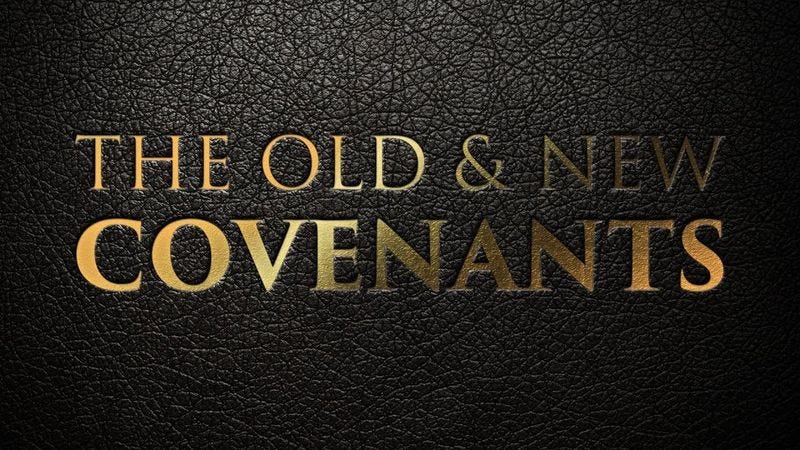The Bible speaks of two distinct covenants established by God: the Old Covenant given to the Israelites through Moses and the New Covenant brought through Jesus Christ. Understanding their differences and the role each plays in God's plan is crucial for Christians. Below is a scripturally supported exploration of these covenants and why the New Covenant is better and authoritative for us today.
The Old Covenant
The Old Covenant was established between God and the nation of Israel at Mount Sinai after their deliverance from Egypt (Exodus 19:5-6). This covenant was centered on the Law, including the Ten Commandments and additional statutes.
Purpose of the Old Covenant
The Old Covenant revealed God’s holiness and man’s sinfulness. Paul wrote, “Therefore the law was our tutor to bring us to Christ, that we might be justified by faith” (Galatians 3:24).
It pointed to Christ. It demonstrated the need for a Savior, as no one could perfectly keep the law. (Romans 3:20).
Conditional Nature
The blessings under the Old Covenant were conditional on obedience: “Now therefore, if you will indeed obey My voice and keep My covenant, then you shall be a special treasure to Me above all people” (Exodus 19:5).
Temporary and Limited
The sacrifices and rituals of the Old Covenant provided temporary atonement but could not take away sins: “For it is not possible that the blood of bulls and goats could take away sins” (Hebrews 10:4).
Exclusive to Israel
The covenant and its laws were given specifically to the Jewish nation: “For all the people answered together and said, ‘All that the Lord has spoken we will do.’ So Moses brought back the words of the people to the Lord” (Exodus 19:8).
The New Covenant
The New Covenant, prophesied in the Old Testament (Jeremiah 31:31-34), was fulfilled in Jesus Christ. This covenant is superior and universal, designed for all people, and provides eternal reconciliation with God.
Instituted by Jesus
Jesus established the New Covenant through His sacrifice: “This cup is the new covenant in My blood, which is shed for you” (Luke 22:20).
His death fulfilled the requirements of the Old Covenant, bringing it to completion: “Do not think that I came to destroy the Law or the Prophets. I did not come to destroy but to fulfill” (Matthew 5:17).
Differences Between the Two Covenants
The Grace of Obedience: While God’s grace has been present throughout history, the New Covenant reveals its fullness in Christ. Under this covenant, we obey Jesus’s commands, described as “the perfect law of liberty” (James 1:25). Obedience is not a means to earn salvation but a loving response to God’s grace. Jesus said, “If you love Me, keep My commandments” (John 14:15).
Relational, Not Legalistic: Unlike the Old Covenant, where adherence to the law was central, the New Covenant emphasizes a relationship with God through Christ. We obey not to legalistically earn righteousness but because we trust that His commands are good for us and demonstrate our love for Him.
External vs. Internal: The Old Covenant was written on tablets of stone, while the New is written on our hearts: “I will put My laws in their mind and write them on their hearts” (Hebrews 8:10).
Temporary vs. Eternal: The Old Covenant was a shadow of things to come, but the New Covenant is eternal: “He takes away the first that He may establish the second” (Hebrews 10:9).
Why the New Covenant is Better
Eternal Forgiveness: Unlike the repeated sacrifices under the Old Covenant, Jesus offered one perfect sacrifice for sins: “By that will we have been sanctified through the offering of the body of Jesus Christ once for all” (Hebrews 10:10).
Direct Access to God: Believers now have direct access to God through Christ: “For through Him we both have access by one Spirit to the Father” (Ephesians 2:18).
Universal Scope: The New Covenant is open to all, not just Israel: “There is neither Jew nor Greek, ... for you are all one in Christ Jesus” (Galatians 3:28).
The Old Testament is Still Vital
While we are no longer under the Old Covenant, the Old Testament remains essential for Christians:
Learning from Examples: “Now all these things happened to them as examples, and they were written for our admonition” (1 Corinthians 10:11).
Revealing God’s Character: It helps us understand God’s holiness, justice, mercy, and faithfulness.
Pointing to Christ: The Old Testament foreshadows Jesus and His work of salvation: “For if you believed Moses, you would believe Me; for he wrote about Me” (John 5:46).
We Cannot Blend the Covenants
Attempting to mix the Old and New Covenants creates confusion and undermines the grace offered through Christ. Paul warns against reverting to the Law:
“You have become estranged from Christ, you who attempt to be justified by law; you have fallen from grace” (Galatians 5:4).
Christians are called to follow Jesus’s commands under the New Covenant, doing so out of love and faith, not as a means of self-righteousness or earning salvation.
A Better Covenant
The Old Covenant served its purpose, pointing to humanity's need for a Savior. In Christ, the New Covenant fulfills and surpasses the Old, offering eternal life and reconciliation with God. As Christians, we must honor the Old Testament’s lessons while living under the commands and promises of the New Covenant. This is the covenant of grace, faith, and eternal hope for all who are in Christ.





